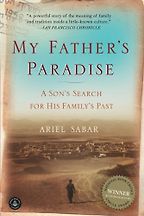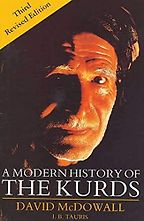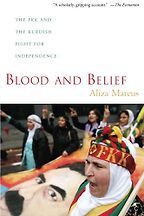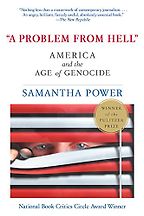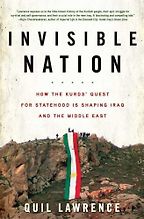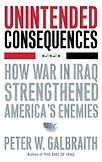You’ve worked on Kurdish issues since 1984. You brought Saddam Hussain’s attacks on Kurdish civilians to the attention of the world and helped the Kurds wrest autonomy from Iraq in 1991. You stood beside your friend, Jalal Talabani in Dihok as Saddam forces shelled the city and, and declared that, for the first time since Woodrow Wilson proposed a Kurdish state, the Kurds now governed a part of their territory. You’ve written two books about the region and named five books about the Kurds. Before we get to the books, can you introduce us to the people?
The Kurds are the original inhabitants of an area that is today divided by Turkey, Iran, Iraq, and Syria. That is Southeast Turkey, Northwest Iran, Northeast Iraq, and Northeast Syria. Kurds are different from the Arabs and Turks in several respects. They speak an Indo-European language, not a Semitic language as do the Arabs, or a Turkic language. While they’re mainly Muslims, they also follow many Zoroastrian traditions. Kurds tend to be more secular and socially liberal than their neighbors. As they like to say, they are the most numerous people in the world without their own state. But they aspire to have a state. And, since 1991, some of them practically do. Iraqi Kurdistan has had autonomy since the 1991 uprising. And in 2005, the Iraqi constitution confirmed Kurdistan’s de facto independence. In 2017, Iraqi Kurdistan held a referendum on independence which had a huge turnout with 92.7% voting for independence.
Turkey has the most Kurds, about 20 million. Turkey has a long history of repressing its Kurdish population, at one point even denying there were Kurds in Turkey (they were called ‘Mountain Turks’ who had forgotten the Turkish language). Kurds have waged a long struggle in Turkey simply to speak Kurdish, broadcast Kurdish programs, have schooling in the Kurdish language, and gain rights as Turkish citizens. In Iran, things have been very repressive for a long time.
In Syria, under successive Arab Syrian regimes, the Kurds didn’t even have citizenship. But since the beginning of the Syrian Civil War, the Kurds have run their own region and carried out a rather remarkable social revolution, based on gender equality and radical environmentalism. Each canton has male and female co-prime ministers and all legislative bodies are 50/50 male-female and are carefully balanced to represent Kurds, Christians, and Arabs.
In The End of Iraq, you quote a favorite saying, “Kurds have no friends but the mountains.” What does that mean?
This is the plight of a stateless people. If you have your own country, you have the protection that comes from recognized borders, the ability to make allies and being a member of the United Nations. But the Kurds are divided among four countries that have historically had a common interest in denying the Kurds their identity. In Iraq, in the 1980s, the attempt to erase the Kurds included genocide.
All Kurdistan, except for the Syrian part, is mountainous. During periods of repression, Kurds have fled to the mountains. Most recently, when Saddam attacked the Kurdish area—after a failed uprising in March of 1991—the population fled to the mountains. The Kurdish resistance has long operated out of the mountains; that’s the meaning of the expression.
President Trump just said, “they have a lot of sand to play with.” Um, care to contest that topographical assessment?
I think it’s fair to say that the president of the United States is not a well-informed person. The Kurds live in a mountainous area, not in a desert, except for an edge in the Syrian part of Kurdistan.
My Father’s Paradise, the first selection I’d like to ask you about, takes us back to the ancient roots of Kurdistan.
This is a book by Ariel Sabar, whose family came from Iraqi Kurdistan. The Jewish population of Iraq with very large in 1940; a quarter of Baghdad’s population was Jewish. But the partition of Palestine sparked increased repression of Jews in the region and led to a mass exodus of Jews from Iraq, including the author’s father. In the Arab parts of Iraq, Jews were fired from their jobs, had their property confiscated and were brutalized. But, in the Kurdish regions, there were no pogroms. On the contrary, the Kurds grieved the exodus of their Jewish neighbors. Within the region different religious communities–not just Muslims, but also Yazidis, Christians and Jews–are considered a constitutive part of Kurdistan. The Kurds have a long tradition of multicultural, multi-religious tolerance.
The author of My Father’s Paradise emphasizes the ancient roots of the Jewish community in Kurdistan and the ancient roots of the region itself. Are the ancient roots of Kurdish nationhood a founding myth or a founding truth?
The Kurds would argue that they go back to the Medes, [to the eighth century BC.] But these are cultural identities. I suspect that if you did a DNA analysis of most ethnic groups, you’d find many different ethnic strands among many members. But there is no doubt that the Kurds are an ethnic group with ancient roots.
Flashing forward a few millennia, please tell me about David McDowall A Modern History of the Kurds.
This is one of the textbook-type histories of the Kurds written by a historian. It’s a very good book for somebody who wants a fairly comprehensive survey of Kurdish history. One of the disadvantages of not having your own country is that you don’t have the archives and scholarship to write your own histories. There are not many surveys to choose from. This is one of the few, and it’s quite good.
Where do you stand on the questions McDowall dangles? Are Kurds a tribe, an ethnicity, a coherent community with characteristics of nationhood? While there are Kurdish tribes, there is a sense among modern Kurds that they are a single people, with a shared identity. And what else is a nation?
It’s important to understand that the way in which a national identity is defined in the Eastern Hemisphere—Europe, Asia and the Middle East—is quite different from how we look at it in the Western Hemisphere. In the Western Hemisphere, national identity goes with geography. In the United States, it doesn’t matter whether your ancestry is Greek, African, English or Chinese. Regardless, you are an American. This is true throughout the Western Hemisphere, including South and Central America and most of Canada. It is one reason why there is so little separatist sentiment in the Western Hemisphere, aside from Quebec. Everybody can belong to a geographic space if they live there.
But in the Eastern hemisphere, the concept of nation, of nationality, goes with ethnicity. That’s how it is with the Kurds. They are citizens of the four countries among which they are divided, but they have a national identity as Kurds. So if you are a Kurd living in Turkey, you you are a Turkish citizen but you are not a Turk. This way of defining a nationality always makes people who are not from the dominant ethnicity feel as if they are second class citizens, and this fuels separatism.
That brings us to your next book, Blood and Belief.
This is by a wonderful journalist named Aliza Marcus. It’s an account of the Kurdistan Workers’ Party, known as the PKK, the most prominent Kurdish movement in Turkey and one of the most difficult for us to wrestle with. It’s the story of how a party founded in Turkey in 1978 has waged a 35 year insurrection against the Turkish state. The PKK was declared to be a terrorist organization by Turkey, by the European Union and by the United States. In the case of the European Union and the United States, this is a political designation aimed to appease Turkey. The PKK is not like what we think of as terrorist organizations, such as Al Qaeda or the Islamic State.
The leader of the PKK, Abdullah Öcalan, has a cult-like following, which Aliza describes. He began as somebody seeking to create an independent Kurdish state based on Marxist principles, with himself as a leader rather in the model of Joseph Stalin. In fact, the younger Öcalan bore an uncanny physical resemblance to Stalin. After Turkish special forces captured him in 1999, he underwent a transformation in beliefs. While in prison, he read the works of a Vermont philosopher named Murray Bookchin who advocated secularism, gender equality, radical environmentalism and communitarianism.
These ideas were picked up by Syrian Kurds. In Northeast Syria, there is strict gender equality in all official positions and in order to make it work, the Kurds have created two positions for each executive job. There are co-prime ministers, co-mayors, and co-party leaders, one male and one female. There are women generals in the Syrian Democratic Forces and many of the fighters are female. The SDF was the main force fighting the Islamic State. In my last visit to Northeast Syria, I visited a TV station where everyone from top management to the cleaning staff, including all the anchors and all the reporters, are women.
Marcus’s book, although a little dated–it doesn’t include what’s happened in Syria–is one of the few definitive works on this unique ideology and the history of the PKK.
Trump just said, “they are no angels.”
He’s swallowed Erdogan’s line on the PKK, that the Syrian Kurds are nothing more than PKK terrorists. They’re not. It’s true that they were influenced by Abdullah Öcalan and there are people who were in the PKK, but the Syrian Kurds created their own statelet and there’s been no evidence of a single terrorist act on Turkey originating from Kurdish-controlled Syria. There is, however, plenty of evidence of Turkey facilitating infiltration of terrorists into Syria. I’ve interviewed quite a number of ISIS fighters and family members and every one got to Syria by going through Turkey. That’s because the Turks intentionally looked the other way. When Trump says “they are no angels” it’s just a way for Trump to excuse himself for having betrayed an ally who lost 11,000 lives fighting the Islamic State on our behalf.
Seems like the right time to discuss A Problem from Hell, a book about genocide which won former UN Ambassador Samantha Power a Pulitzer. Why have you chosen it?
Samantha Power first came to the public notice for her work on the American response to genocide in Bosnia, or to be more precise, the lack thereof. The title, A Problem From Hell is a quote from Secretary of State Warren Christopher’s congressional testimony about the situation in Bosnia, explaining why the United States couldn’t do anything to stop the genocide there. She was a young reporter during the Bosnia war, but she looks not just at that genocide but at earlier genocides. These include the Ottoman genocide against the Armenians in the First World War and Saddam’s genocide against the Kurds.
She describes how Saddam destroyed every village in Kurdistan and gassed the Kurds. The US Senate actually tried to stop the genocide by imposing comprehensive sanctions on Iraq, unanimously passing The Prevention of Genocide Act of 1988. The Reagan administration opposed even weak sanctions, even as it agreed that Saddam had used poison gas on the Kurds. They thought, as matter of realpolitik, that Iraq was more important to American interests than the Kurds and that with the end of the Iran-Iraq War there’d be great business opportunities in Iraq. That didn’t turn out well. The Reagan administration gave Saddam a free pass after he destroyed all the villages of Kurdistan, murdered 180,000 Kurds, and used poison gas. Not surprisingly, Saddam thought he could get away with anything. And, on the 2nd of August, 1990 he invaded Kuwait.
As Samantha Power makes clear, your actions brought the gas attacks and mass executions of Kurdish men, women and children to the attention of the world, and you authored The Prevention of Genocide Act of 1988 and pushed it through the Senate. Because you never look the other way, I’m going to ask you a question that makes me wince: What do you think is happening to the Kurds in Turkey, now that President Trump has pulled out the forces who kept their enemies at bay?
I was just in Syrian Kurdistan at the end of September, ten days before Trump greenlit Erdogan’s action. One of the people I met was a young woman, Hevrin Khalaf, the founder of the Future Syria Party, which was intended to bring Kurds, Christians, and Arabs together. In our meeting, she asked me ‘will the United States support us?’ I had to tell her, ‘with our current president, we don’t know.’
Now we know. She was pulled out of her car, brutally beaten, and shot a few days ago. There are 200,000 people who have fled their homes there, hundreds of Kurds are dead. Turkish forces are filming themselves executing Kurdish prisoners, posting pictures of themselves with dead Kurds. These are war crimes. These are crimes against humanity.
The final book you named is Invisible Nation. What does this add to the picture?
Lawrence is an NPR reporter who spent a lot of time in Iraq and the Middle East. It’s a reporter’s account of his interaction with the Kurds and their struggle for an independent homeland. He gets a huge part of the story right and he really understands that what the Kurds always wanted is independence.
There’s a wonderful episode in the book when Quil recounts driving with Jalal Talabani, a Kurdish leader who at that point is the president of Iraq. The Bush administration always described Jalal as Iraqi to downplay Kurdish aspirations for independence. Talabani, who was a very good friend of mine, says to Quil as they are driving into his home territory, “Welcome to my country.” And at that point Jalal was president of all of Iraq. But Quil understands that Talabani does not mean Iraq, but Kurdistan. So Quil gets a lot of the key details of the last 30 years for the Kurds and he tells the story of that period well.
Your book, Unintended Consequences, takes the story a little bit further.
My first book, The End of Iraq, was partly a memoir of my experience in Iraq and Kurdistan. Unintended Consequences looks at what emerged from the Iraq War, a war that President George W. Bush said was intended to combat an “Axis of Evil,” by which he meant Iraq, Iran, and North Korea. It’s a metaphor that was geometrically challenged—since an axis is between two points and not three—but also historically challenged. The Berlin-Rome Axis in World War II was a pact between allies while, at the time Bush gave his axis of evil speech, there were no more bitter enemies in the world than Iran of the Ayatollahs and Saddam Hussein’s Iraq. The US invasion brought to power in Iraq—through democratic elections—Shiite religious parties that Iran had sponsored for decades, including one actually founded in Tehran. So now there is a Baghdad-Tehran axis, and Bush created it. In fact, Iran’s closest ally in the world is Iraq.
Successive American administrations never like to admit that. The classic response to a foreign policy error is not to admit error and do something different, but to double down. Since the invasion and since Iran’s allies took power in Iraq, we’ve been consistently supporting Iran’s allies.
In terms of what he does (as opposed to what he says) Trump might be the US president most helpful to Iran. In 2017, in an operation planned by Qassem Soleimani, the head of Iran’s al Qods force, Trump let an Iraqi Shiite militia use American supplied Abrams tanks to attack the Kurds. Abu Mahdi Muhandes, the Shiite commander with the American tanks, is a US-designated terrorist, having been convicted of blowing up the US Embassy in Kuwait in 1983. And, while Trump let Iran’s proxies use US tanks, he refused to provide these weapons to the Iraqi Kurds, even though they have been America’s most reliable ally in this part of the world.
Get the weekly Five Books newsletter
And, of course, Iran and its client Bashir al Assad are the big winners from Trump’s decision to pull out of Northeast Syria. On October 6, Syria was effectively divided between an American allied Kurdish zone controlling one third of Syria and an Iran allied government zone controlling the other two thirds. Today, Iran’s allies control all but a small part of the country. So we continue to strengthen Iran, and to do its bidding, at the same time as Trump is pulling out of the nuclear deal on the grounds that Iran is a malign force in the region. It’s bizarre.
Final question: Defenders of Donald Trump’s policy argue that the decimation of Kurdistan was inevitable, if unintended. Even the Kurds seem fatalistic about their waves of woe. Seventeenth century Kurdish poet Ahmadi-I Khani wrote that surrounding powers “have made the Kurdish people targets for the arrows of fate. They are said to be the keys to the borders.” So, my question to you is: Are Trump’s defenders correct that the decimation of Kurdistan is inevitable?
I don’t think anything in human affairs is completely inevitable. But what I do think is close to inevitable is that when a people in a geographically defined area consistently, persistently, and overwhelmingly desire to make their own state, sooner or later they’re going to get their own state. I don’t think that you’re going to see stability in the Middle East until the Kurds have their own state, at least in Iraq, and perhaps also in Syria.
Interview by Eve Gerber
October 20, 2019. Updated: May 16, 2021
Five Books aims to keep its book recommendations and interviews up to date. If you are the interviewee and would like to update your choice of books (or even just what you say about them) please email us at [email protected]
Five Books interviews are expensive to produce. If you've enjoyed this interview, please support us by donating a small amount.
